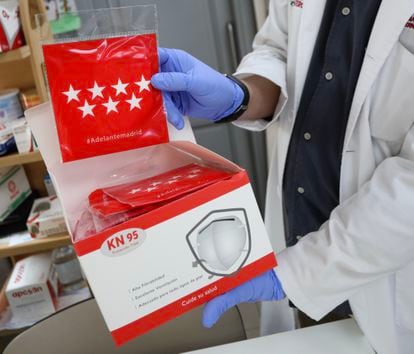Daily coronavirus-related deaths in Spain fall to 143, the lowest figure since March 18
According to the Health Ministry, Spain has now carried out 1.6 million PCR tests since the crisis began
/cloudfront-eu-central-1.images.arcpublishing.com/prisa/UN2T5ULG6JFXLNQ3722XAB7RQU.aspx)

The number of daily coronavirus-related fatalities in Spain came in at 143 on Sunday, the lowest figure seen since March 18, four days after the state of alarm was implemented by the government in a bid to combat the spread of the pandemic. The total number of victims in Spain now stands at 26,621, a 0.54% rise on the day before.
The figure was communicated by Spanish Prime Minister Pedro Sánchez on Sunday morning to the country’s regional premiers, during their weekly video conference call.
On Saturday the number of daily fatalities was 179, according to data supplied by the Health Ministry, after a three-day run of figures exceeding 200.
A total of 48,046 health workers in Spain have been infected with the coronavirus, according to the latest figures
The number of new infections confirmed via PCR tests was 621 according to Sunday’s data, a rise of just 0.28% of the total. For 10 days now the rate of new infections has come in below 1%.
That said, all regions continue to report new cases of the coronavirus, some with a rate of more than two new cases per 100,000 inhabitants in a single day: Castilla-La Mancha, Castilla y León, La Rioja and the Basque Country.
Meanwhile, 2,214 patients were discharged from hospital after having recovered from the Covid-19 disease, bringing the total during the crisis so far to 136,166.
A total of 48,046 health workers in Spain have been infected with the coronavirus, according to the latest figures from the Health Ministry. In the month of May alone, more than 8,000 medical professionals have tested positive. One in eight men and one in three women in Spain with the coronavirus belong to this collective.
As for admissions to intensive care units (ICUs), these fell on Sunday to 36, after a figure of 70 was recorded on Saturday.
Today’s figures should be regarded with certain caution, given that since the coronavirus crisis began there has been underreporting of the data on Sundays and Mondays, given lower staffing levels at hospitals.
According to the Health Ministry, Spain has now carried out 1.6 million PCR tests since the coronavirus crisis began. These tests detect an active Covid-19 infection, and are considered to be the most accurate way of monitoring the spread of the disease. There have been a total of 224,390 coronavirus cases confirmed via PCR testing in Spain.
Madrid hospital
The premier of Madrid, Isabel Díaz Ayuso, has announced that a new hospital will be created in the region specifically for dealing with epidemics such as Covid-19 or the flu. The center will be permanent and will be constructed in the fall. Díaz Ayuso, who has been widely criticized this week after Madrid’s request to move to Phase 1 of the coronavirus deescalation plan was rejected by the central government, made the announcement in an interview with Spanish daily El Mundo. “If everything continues as the experts are saying, this virus is going to be among us for one or two years,” she said.

Doubts about masks
Pharmacies in the Madrid region will be distributing seven million FFP2 face masks for free among the public, as supplied by the regional government. But the heads of preventive medicine in the region’s hospitals have sent a letter to the regional administration, on the basis that such masks are not recommended for the entire population and may actually be counterproductive.

The specialists argue that the use of FFP2 and FFP3 protection masks is not currently recommended among the general public by the European Centre for Disease Prevention and Control, the World Health Organization (WHO) or the Center for Disease Control (CDC) in the United States.
They say that the masks are difficult to put on, and if they are not used properly they are inefficient. The experts also argue that the continued use of these masks can make breathing difficult, and they encourage people to touch their face more frequently, thus increasing the risk of infection.
With reporting by Emilio de Benito, José Marcos and Isabel Valdés.
English version by Simon Hunter.
/cloudfront-eu-central-1.images.arcpublishing.com/prisa/DROWKFTPX5FDLH3YSFNAB7BPXQ.aspx)
/cloudfront-eu-central-1.images.arcpublishing.com/prisa/65Q7YY2S5ZE7BNDJBXIZHT3ZW4.jpg)










































